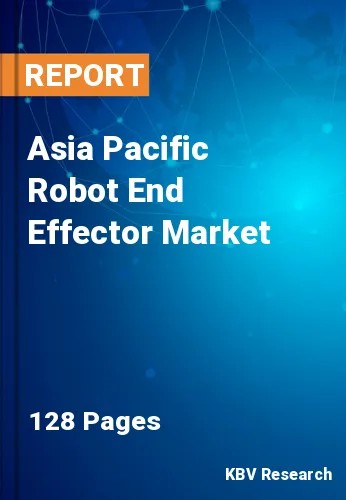The Asia Pacific Robot End Effector Market would witness market growth of 13.0% CAGR during the forecast period (2022-2028).
The strongest and most adaptable gripper technologies are pneumatic grippers. These grippers are employed in the pharmaceutical, electronic, and cosmetic sectors. The robot installation is carried out in controlled environments and cleanrooms to avoid contamination. Previously many manufacturing facilities used hydraulic end-effectors. Yet, a significant concern for the industry is high oil spills. Electric end effectors are also slower and less effective than grippers.
These considerations are contributing to the pneumatic grippers' increasing utilization. Additionally, this type of robot end effectors is experiencing numerous new advancements. Another element influencing high research is the demand for robotic end effectors. During the forecast period, market R&D investments are expected to soar. The development of 3D grippers is being facilitated by this research. The 3D grippers are reliable and can safely grab any product. These robots have strong safety standards and features as well. These variables together will increase the use of 3D grippers.
China's Ministry of Industry and Information Technology released a five-year robotics plan in December 2021. By 2025, the initiative hopes to raise the operational income growth rate in the robotics sector. Additionally, it seeks to improve industry standardization and create a more reliable supply chain. The aging population, particularly in China, is pushing businesses toward industrial robots and automation to cut costs because many Asian nations are densely populated, and the older population is creating a future issue. The need for the associated end effectors of industrial robots is anticipated to develop along with their use in automation. The COVID-19 pandemic has propelled the region into a technology adoption hyperdrive that is anticipated to open up sizable potential opportunities for the robot end effector market in the coming years.
The China market dominated the Asia Pacific Robot End Effector Market by Country in 2021, and would continue to be a dominant market till 2028; thereby, achieving a market value of $481.4 million by2028. The Japan market is experiencing a CAGR of 12.3% during (2022 - 2028). Additionally, The India market would exhibit a CAGR of 13.7% during (2022 - 2028).
Based on Type, the market is segmented into Grippers, Welding Guns, Tool Changers, Clamps, Suction Cups, and Others. Based on Vertical, the market is segmented into Automotive, Metal & Machinery, Food & Beverage, Electrical & Electronics, Plastic, Rubber, & Chemical, Precision Engineering & Optics, Pharmaceutical & Cosmetics, E-Commerce, and Others. Based on Robot Type, the market is segmented into Traditional Industrial Robots, and Collaborative Industrial Robots. Based on Application, the market is segmented into Handling, Welding, Assembly, Processing, Dispensing, and Others. Based on countries, the market is segmented into China, Japan, India, South Korea, Singapore, Malaysia, and Rest of Asia Pacific.
Free Valuable Insights: The Worldwide Robot End Effector Market is Projected to reach USD 4.2 Billion by 2028, at a CAGR of 12.6%
The market research report covers the analysis of key stake holders of the market. Key companies profiled in the report include ABB Ltd., ATI Industrial Automation, Inc. (Novanta, Inc.), DESTACO, Inc. (Dover Corporation), Kuka AG (Midea Investment Holding Co., Ltd.), Bastian Solutions, LLC (Toyota Advanced Logistics Group) (Toyota Industries Corporation), Piab AB (Patricia Industries) (Investor AB), Robotiq, Inc., SCHUNK GmbH & Co. KG, J. Schmalz GmbH and Zimmer Group.
By Type
By Vertical
By Robot Type
By Application
By Country
Our team of dedicated experts can provide you with attractive expansion opportunities for your business.

